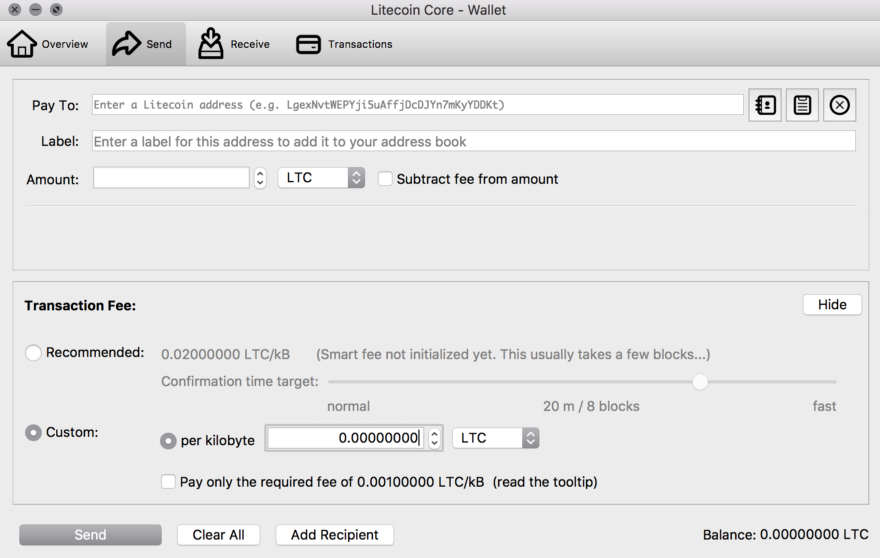Understanding Default Minimum Fees
Litecoin’s New Minimum Transaction and Relay Fees Per Kilobyte (kB).
Currently, Litecoin’s minimum transaction and relay fees are set by default to 0.001 LTC/kB. However with the recent increase in Litecoin’s price, the Litecoin development team has decided to lower them:
TLDR:
Minimum transaction fee: 0.0001 LTC/kilobyte
Minimum relay fee: 0.00001 LTC/kilobyte
Now let’s talk about what each of these two fees mean.
Minimum Transaction Fee
The default setting for a minimum transaction fee for Litecoin core is currently 0.001 LTC.
One common misperception of the minimum transaction fee is that 0.001 LTC is the lowest fee you can pay for it to get processed by the miners. However, if you look closer you’ll noticed that the fee is actually 0.001/kB (emphasis on the kB). The kB here actually refers to the amount of blockspace your transaction will take if it gets recorded. This means that the transaction fee is dependent not on the # of LTC you’re sending, but rather on how much space it’s taking up in the block. This means your actual transaction fee can be lower than 0.001 LTC. Below is a formula on how you might be able to accurately estimate what minimum fee you should send for your transaction:
0.001 LTC x size of the data of the transaction to be recorded in the blockchain.
If a standard Litecoin transaction is around 200 bytes (where you received LTC from 1 address and sent LTC to 1 address), then you should set your minimum fee to 0.0002 LTC.
0.001 LTC x 200bytes = 0.0002 LTC
You can do this by clicking the “send” tab in Litecoin Core then “choose” on the bottom left next to “transaction fee.” Click “Custom” and “Pay only the required fee 0.001 LTC/kB.” You can also do this with many other Litecoin wallets as well.
Data Size of Transactions
It’s important to note that the data size of your transaction isn’t dependent on the number of Litecoins you send. Rather, it’s dependent on how many transactions you received in your LTC address and how many transactions you are sending.
Here’s an example of a standard Litecoin Transaction (1 transaction in and 1 transaction out):
Note that the size of the transaction is 191 bytes. This is taken from live.blockcypher.com/ltc.
Now let’s look at a transaction that has 33 inputs and 2 outputs and how much space in the blockchain this transaction takes:
Data Transaction Size: 4941 bytes. This is taken from live.blockcypher.com
Therefore the default minimum transaction fee for this transaction would be:
0.001 LTC x 4.941 kB= 0.004941 LTC
The reason why a transaction like this takes up more space in the block is because you need to provide 33 signatures to cash out of each of the inputs you received and 2 signatures to send to the 2 Litecoin addresses (1 of which is a change address).
This means that multisig transactions will also require a higher minimum transaction fee because of the amount of blockspace it takes up.
It is important to note that miners will most likely select high fee/kB transactions in order to maximize their profits. Keep this in mind as you custom set your fees. Lower transactions may take longer to send. This is why some people custom set their fees to be higher than the default minimum transaction fee/kB.
Minimum Relay Fee
The default minimum relay fee is also currently at 0.001 LTC.
Now remember when we were talking about the default minimum transaction fee? Well both the minimum transaction fee and minimum relay fee are actually “suggestions” and can be bypassed by individual nodes.
This is important because when you send your transaction, it is stored in something called a “memory pool” in full nodes while it waits to be processed by a miner. If your transaction is below the minimum relay fee, it will be dropped out of the memory pool and therefore won’t get processed.
The Significance of the New Minimum Transaction and Relay Fees
Minimum transaction fee: 0.0001 LTC/kB
Minimum relay fee: 0.00001 LTC/kB
Because the minimum transaction and relay fees were the same, understanding the difference wasn’t as big of a deal. But now that the relay fee is 10x’s less than the transaction fee, let’s see how this might affect users and miners.
If you send the new default minimum transaction fee of 0.0001 LTC/kB, then you can rest assured it will pass through the network without an issue if there isn’t a backlog in the memory pool.
But as we discussed earlier, the minimum transaction fee can be bypassed. But how low exactly can a user set the transaction fee? This is limited by the default minimum relay fee of 0.00001 LTC.
If we assume that most nodes simply download the Litecoin Core wallet and don’t adjust their minimum relay fees to be lower, it’s a pretty safe bet that this is the lowest fee you can set for your transaction to be relayed across the network.
In short, hopefully this article will empower you to send lower fees by giving you an idea of how to estimate the necessary minimum fees for your transactions:
Determine the data size of your transaction.
Determine if you want to play it safe and send it via the default minimum transaction if the mempool isn’t clogged. If it is, you’ll have to increase the fees because the demand to be included in the block will be high and therefore more people use higher
If not, then decide if you want to send the minimum relay fee (or slightly above) to keep more of your LTC.
If you feel particularly adventurous, try sending a transaction below the default minimum relay fee and see if it gets picked up by random nodes that will process the transaction because they custom set their minimum relay fees below the new default of 0.00001 LTC.
Remember to give me claps to the left, donations below, and share with your friends! Until next time, onwards and upwards. 😁
L.S.C. Donation Addresses
LTC: LgGHRsbYHs93gKttBMehLzth3xDAU3tCSZ
BTC: 3HFCMjr6xQKSfmU7wCPzrZJVvgwrdf7Qzd (Segwit address. Legacy and Segwit chains accepted)



